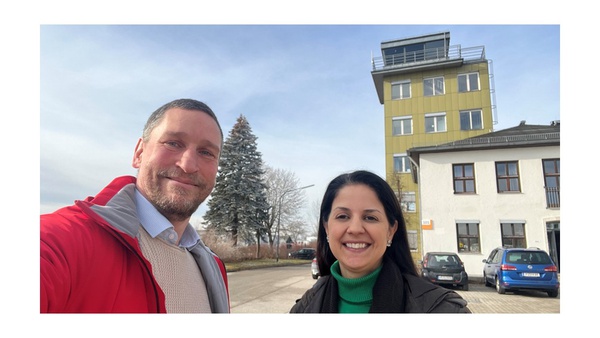Professor Giovanna Ronzani visited our Chair in January 2025 to collaborate on Advanced Air Mobility research and future partnerships.

Welcome to the Chair of Air Traffic Concepts.
Since March 1, 2022, I am heading the chair and establishing research teams on adaptive air traffic concepts, innovations in air traffic management, mobility in regional/urban airspace, and airport management (passenger and cargo logistics).
If you would like to become part of the team or are looking for a collaboration partner, please feel free to contact me directly.
The air traffic system represents all individual systems involved and their complex interactions. These systems can be specific technologies, such as electrically or autonomously operated aircraft, or actual operational processes, such as the optimized sequencing of arrivals and departures at the airport. By integrating a large number of individual systems in an interconnected ATM research laboratory, it is possible to evaluate not only the specific benefits of each individual system but also the impact of their interaction within the entire air traffic system.
Due to the close interconnection between airports and ground-based traffic, the performance of the entire system is dependent on the efficient management of local operations. Increasingly, technological advances in sensor technology and artificial intelligence are enabling the automation of airport handling processes.
In classical air traffic management, static airspace structures lead to inefficient traffic flows in highly congested traffic scenarios. Innovative concepts, such as dynamic airspace sectorization, long-range air traffic management, and mobile sectors, must be consistently developed further and implemented in an application-oriented manner.
Future mobility will result in a greater interconnection of transport modes. With a focus on air transport, concepts of electric flying, automated/autonomous guidance and control of flying platforms, and the interactions between the various modes of transportation represent significant challenges.
Developing innovative concepts and their implementation in air traffic requires profound methodological competence. In addition to fundamental data analysis skills, this also includes handling and processing large amounts of data and visualizing the results.
The course explores aviation as a complex system of systems, where diverse operators, including airlines, airports, air traffic management, and regulatory bodies, pursue varying objectives such as safety, efficiency, profitability, and sustainability. The series provides a comprehensive overview of air traffic management, airport operations, environmental challenges, and emerging technologies.
The explores the interplay between transportation networks, infrastructure, and societal development. It covers historical and technological milestones shaping mobility, analyzes spatial and temporal factors influencing transport efficiency, and delves into the dynamics of transportation systems, including mass transit, urban mobility, and logistics.
For effective management of air traffic, it is necessary to understand operational, infrastructural, legal, ecological, and economic constraints. It will be explained how to determine capacity, work load, and efficiency indicators, and it will be taught how to analyze and evaluate actual flight operations.
The course provides an in-depth examination of airport design, operations, and the integration of emerging Urban Air Mobility (UAM) technologies. From foundational topics like runway and terminal design to advanced concepts like vertiports and UAM-specific air traffic management, the series emphasizes innovation, sustainability, and operational efficiency.
We investigate different aspects of air traffic as an overall system (e.g. network) and as an interconnection of many smaller systems (e.g. aircraft, airport, air traffic control). These aspects include passenger processes at the airport, efficient airport management, approach/departure optimization, capacity improvements, flight track analysis, and procedure optimization, development of evaluation metrics, and many more. The following topics offer a small selection of possible areas of focus. Do not hesitate to contact us with your own ideas as well.

Univ.-Prof. Dr.-Ing. habil. Michael Schultz
Telefon: +49 89 6004-3040
Email: michael.schultz@unibw.de
Directions to the Chair.

